Tory asylum policy could sentence LGBTQ+ refugees to death: ‘There is a large element of racism’

Turkish Coast Guard members intervene a boat carrying refugees, who were trying to go to Greek Islands, after being caught by the Turkish coast guards. (Suleyman Elcin/Anadolu Agency/Getty)
On World Refugee Day, we question why things are getting worse for asylum seekers – particularly for LGBTQ+ refugees.
Increasingly, governments are pursuing hardline approaches that leave asylum seekers out in the cold – there was outcry when Britain’s Home Office announced that it would send refugees who arrive via the English Channel to Rwanda, but the UK is not alone in its stance.
Israel has adopted a similar scheme, while Denmark has been up front that its goal is to have no refugees and is in talks with Rwanda about opening a facility there.
The outlook is getting progressively worse for LGBTQ+ asylum seekers, according to Sebastian Rocca, CEO of Micro Rainbow, a charity that provides safe housing for LGBTQ+ refugees.
In the worst case scenarios, refugees could end up dead as a result of these policies.
Queer people face particular challenges when claiming asylum on the basis of their sexuality or gender identity, because they must “prove” that they really are who they say they are – but in most cases, they’re unlikely to have any hard evidence to back up their claims.
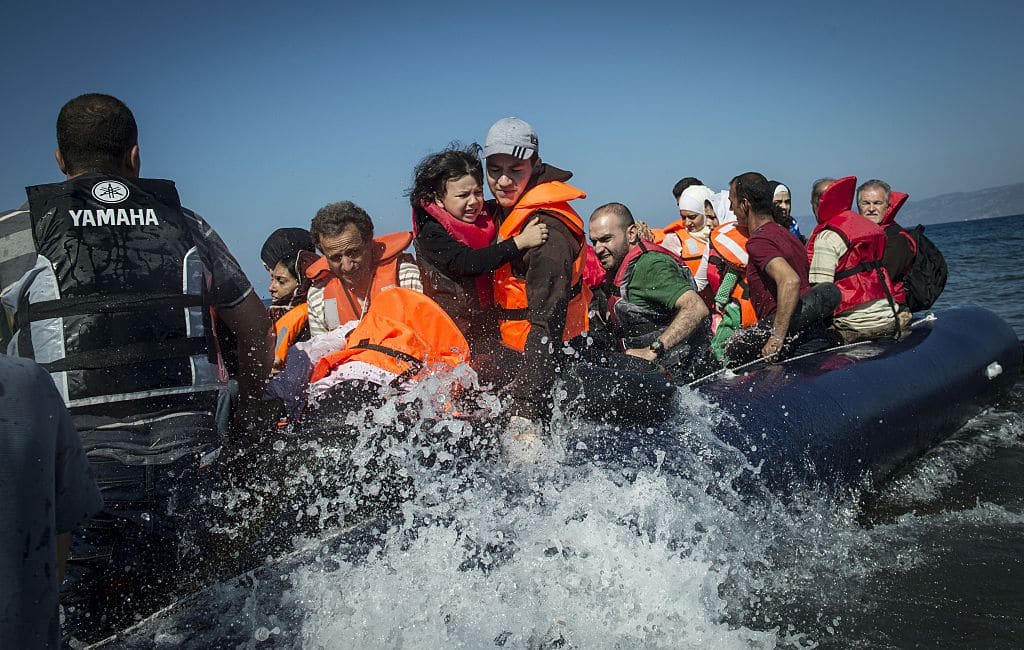
Refugees get off the boat after it arrived in Lesbos Island, Greece on September 17, 2015. (Ozge Elif Kizil/Anadolu Agency/Getty)
“LGBTQI asylum seekers always had it hard to claim asylum and it is even harder now,” Rocca says.
One of the things that has made it even more likely for LGBTQ+ people to be refused asylum by the UK is the Tories’ Nationality and Borders Act 2022. Instead of people needing to prove there is a “reasonable degree of likelihood” they’d be persecuted, as was previously the case, the burden of proof has been raised to the much higher “balance of probabilities”.
“What that means is that you have to prove you are LGBTQI and often all you have is your personal story,” Rocca says.
That comes with its own set of challenges for LGBTQ+ asylum seekers who haven’t been able to live openly before fleeing their home countries.
“You don’t come to the UK with a bundle of evidence,” Rocca says. “You don’t come with pictures of your ex-partner, for example. You might have destroyed them to keep yourself or your partner safe. If you have been living in hiding all your life, you really don’t have anything to prove your sexuality or gender identity.”
Governments are trying to ‘scapegoat’ asylum seekers
Rocca is also increasingly worried by the UK government’s focus on how people come to the UK rather than why they come to the UK. The Home Office sees those who arrive via the English Channel as “illegal”, but refugees often have very valid reasons for seeking asylum through unofficial means.
“If you are a lesbian from Iran, you’re probably married, because they force you to marry, your husband controls your passport, if you have one. How can she come to the UK through ‘legal’ routes when she can’t even get ahold of her own passport?” Rocca asks. “Someone like her will be disadvantaged just because she can’t come through a legal route.”
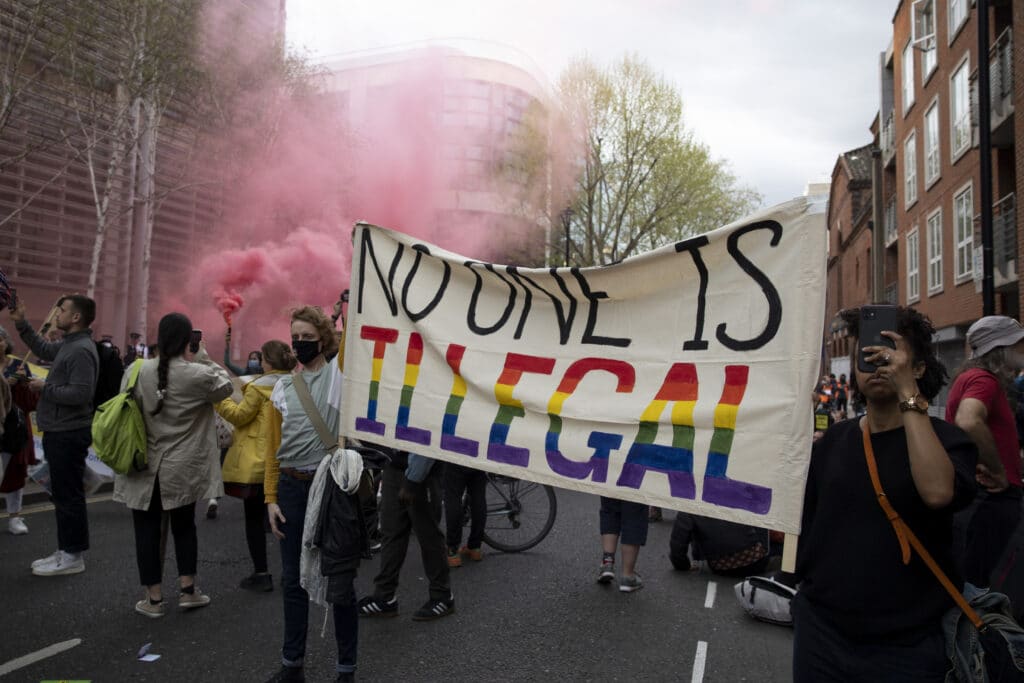
Government plans to tighten immigration rules were met with fierce criticism. (Hesther Ng/SOPA Images/LightRocket via Getty Images)
He makes the point that LGBTQ+ people flee their home countries because they are afraid for their lives. Many of those people are arriving in countries like the UK and are being faced with a hostile environment.
“It’s almost as if we need a scapegoat and migrants are the best candidates to scapegoat at times when things are not going well,” Rocca suggests. “Inflation is high, cost of living is going up, it’s convenient to focus people’s attention on something else and to blame someone else for what’s going on.”
The UK government’s plan to send refugees to Rwanda might be intended as a distraction, but it’s going to have real-world impacts – particularly on LGBTQ+ asylum seekers.
In Brazil there’s a murder of an LGBTQI person every 17 hours.
“Honestly, the ultimate impact of this policy could be death,” Rocca says. “Rwanda has decriminalised homosexuality and that’s great, it’s certainly a step forward, however what we seem to miss is, what is life like on the ground?
“There are other countries like Brazil, South Africa, that have fantastic legislation for LGBTQ+ people, yet in Brazil there’s a murder of an LGBTQI person every 17 hours. In South Africa, people are beaten up and raped regularly for being LGBTQI. So we can’t look at the laws only.”
Rwanda is a ‘hostile environment’
As far as Rocca sees it, Rwanda is “clearly” a hostile environment for LGBTQ+ people.
“Imagine a trans woman in a big processing centre in Rwanda. She will not be safe. We run safe houses here in the UK for LGBTQI people to keep them safe because we know when they share accommodation with other people from their countries, they face violence and abuse.”
The policy is already having a chilling effect on asylum seekers – many are terrified that the government will send them to Rwanda.
“Our asylum seekers are petrified, they are terrified. They call us worried that they will be sent to Rwanda. Because they’re scared, people might go underground.”
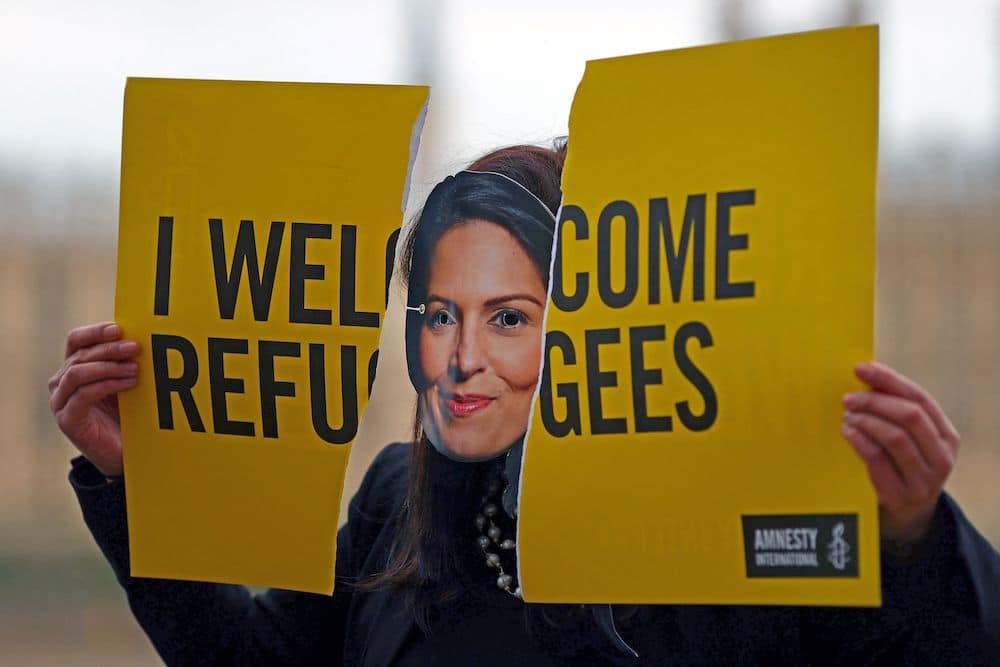
An activist from Amnesty International wears a mask depicting Britain’s Home Secretary Priti Patel. (AFP via Getty/ ADRIAN DENNIS)
This is echoed by Daniel Sohege, a specialist in international refugee law and director of Stand for All, a human rights advocacy group. He says asylum systems in the UK and other countries adopt a sceptical approach to LGBTQ+ refugees right from the get go, and the onus is on the asylum seeker to prove that they are who they say the are.
“There’s a case recently of a gentleman, he had been living in the UK undocumented for a period of time before he realised he could actually seek asylum. He was quizzed during his asylum application about why he was single if he was gay. They therefore said, ‘You’ve been single so long, you can’t be gay – we think you’re making this up.’
“They’re asked the most horrendous questions, the most intrusive questions, to discuss sexuality. It’s almost starting from this point of disbelief – if you don’t look a certain way, appear a certain way, they automatically decide, no, you’re not LGBTQ.”
The goal, Sohege says, is to try to stop people from seeking asylum in the first place – that’s not just limited to the UK.
“We are moving to a point where exclusion becomes the prime motivation for the government and for any processes they put in place around asylum seekers.”
He agrees with Rocca that the outlook appears to be getting worse for LGBTQ+ asylum seekers, and for refugees more broadly. That’s worrying because they were already starting on the back foot.
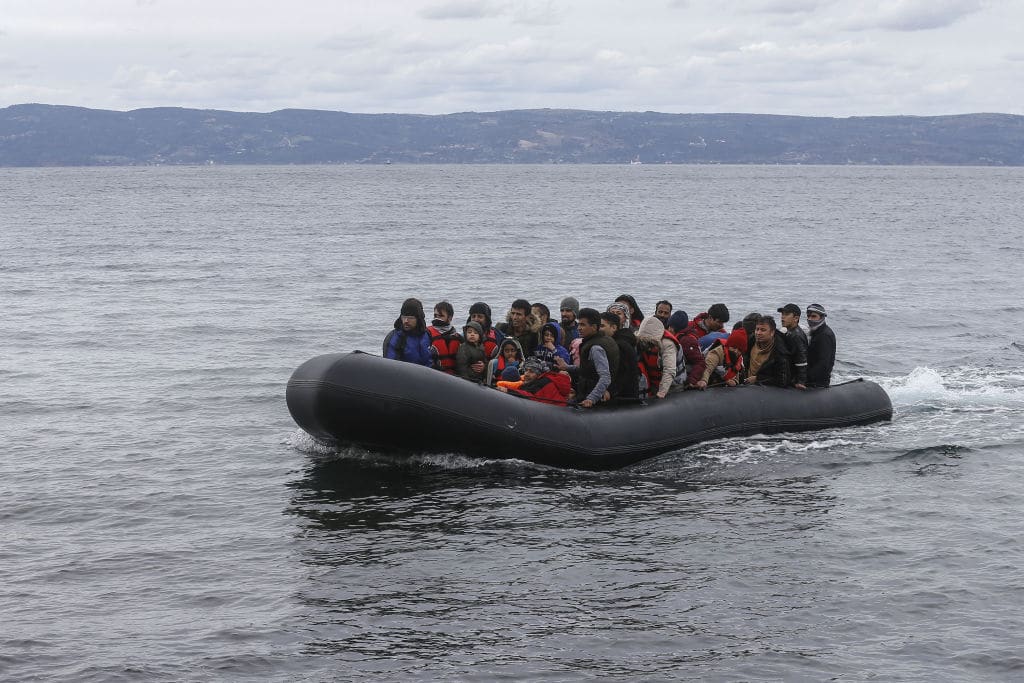
Migrants escaped from civil war in Syria, who want to proceed to Europe, arrive with a boat at a shore in Lesbos Island on Greece on February 28, 2020. (Ayhan Mehmet/Anadolu Agency via Getty)
“There have been some very deliberate attacks against not just asylum seekers, but the actual international asylum regime,” he says.
“The Nationality and Borders Bill, for example, is undermining the Refugee Convention quite significantly. Other countries are doing similar things and trying to make similar excuses. What’s interesting is, if you look at the UK, there’s actually been a softening of attitudes towards immigration in general, and that includes refugees.”
He continues: “A high proportion of people say they would support refugees coming because they’re fleeing war and persecution, but that’s not being upheld when it comes to specific types of crossings, such as Channel crossings, because of the narrative that’s being put across by government and certain media outlets. It creates a disconnect in people’s minds between asylum seekers and whether they arrive through ‘legal’ routes.”
Racism is at play in governments’ approach to refugees
Sohege thinks governments know that refugees are an easy target – they are a group that are already deeply marginalised.
“We’ve got a pandemic, a financial crisis going on – asylum seekers make for an easy target. They don’t have really much in way of being able to campaign for their own rights. It’s easy for governments to scapegoat them, and anytime something goes wrong, they wheel out the same old things – we’re going to tackle immigration, tackle asylum seekers, tackle Channel crossings.”
Sohege also notes that part of the increasing hostility surrounding asylum seekers is down to blatant racism. European Union countries have happily taken in refugees from Ukraine, who have been forced to flee their homes by war. They’re much less likely to do so when those fleeing violence and persecution aren’t white.
“There is quite a large element of racism within this and we’ve seen this in the last couple of months with what’s been happening with Ukraine,” Sohege says. He makes the point that many European Union countries have happy welcomed Ukrainian refugees, but they’re much less likely to do so when those fleeing violence and persecution aren’t white.
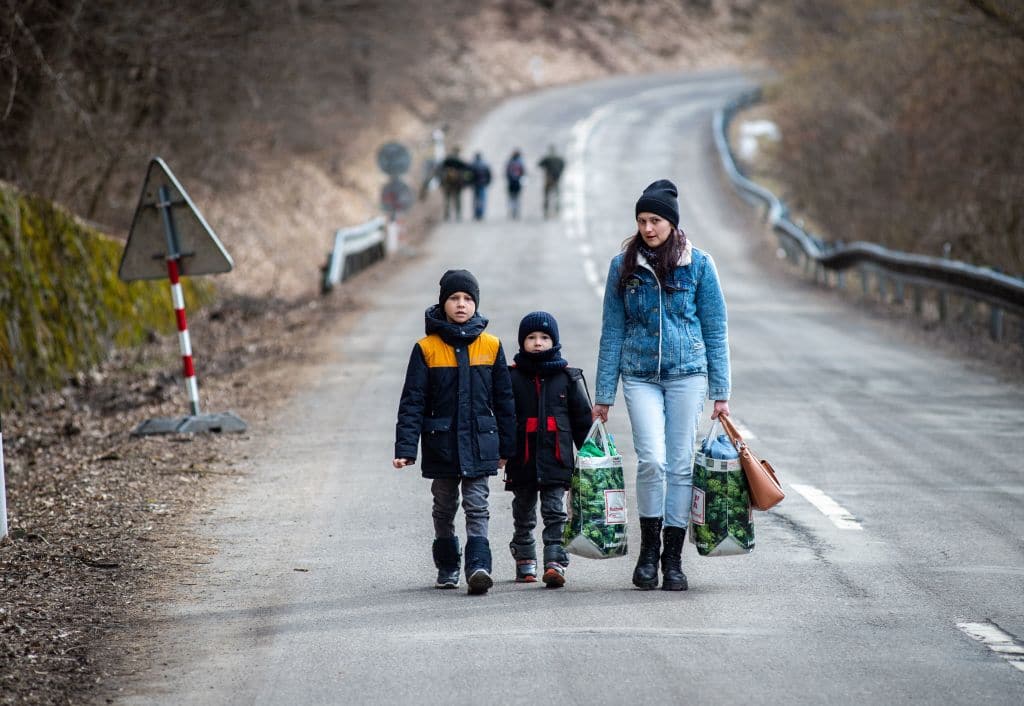
A woman with two children and carrying bags walk on a street to leave Ukraine. (PETER LAZAR/AFP via Getty)
Sohege is profoundly concerned about the UK government’s plan to send refugees to Rwanda. He says it’s “dangerous” – and he thinks it’s going to embolden other governments to follow suit.
“We’re already seeing other countries such as Denmark trying to make similar deals. I think it’s inevitable,” Sohege says.
“Priti Patel herself has said she wants this to be a model for other countries, so we will see more countries going down this route which will only serve to put more asylum seekers at risk.”
There’s little reason to believe things are going to get better for refugees anytime soon. In May, the United Nations Refugee Agency announced that the number of people forcibly displaced by conflict, violence and human rights violations had reached over 100 million for the first time ever.
Nobody is leaving their home, their loved ones, and their lives behind because they want to – they’re fleeing because they don’t have any other option. Until western governments recognise that fact, asylum seekers will continue to face brutalisation and discrimination everywhere they go.
LGBTQ+ asylum seekers need your help. Please consider donating to PinkNews‘ LGBTQ+ Refugees Welcome campaign through GoFundMe, which benefits OutRight Action International’s LGBTIQ Ukraine Emergency Fund and Micro Rainbow.

